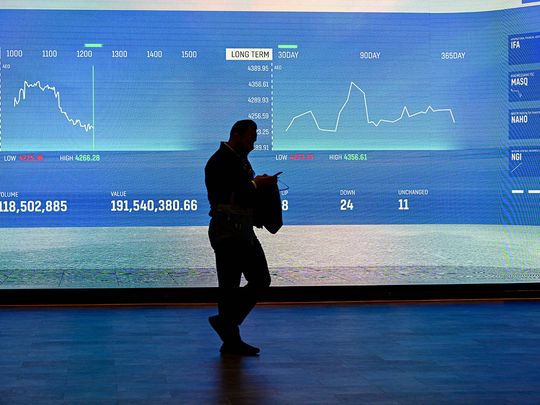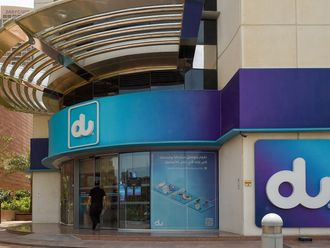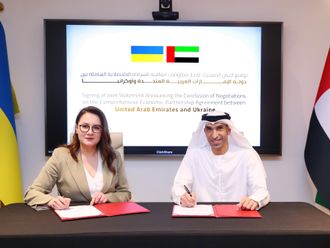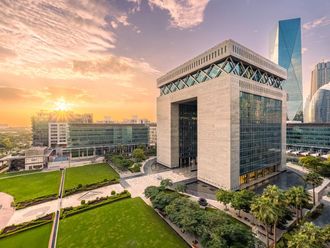
Dubai: The DFM and ADX indices dropped in early trading in reaction to the latest Middle East crisis that unfolded over the weekend.
The DFM is down by over 1 per cent, while ADX is lower by nearly 0.6 per cent in the first 15 minutes of the market opening after the extended Eid break.
In Abu Dhabi, bellwethers IHC and Alpha Dhabi are trading marginally lower, while Emaar Properties and Emaar Development were in the red by over 1 per cent in the first 15 minutes. So was Union Properties, down 1.53 per cent. Mega-banks Emirates NBD and DIB too have seen some declines. The main gainer in the early session is Gulf Navigation, up 2.9 per cent.
By 10.45am, the pace of the drops was slowing down. Emaar Development is back in positive, while Emaar Properties' slip narrowed to under 1 per cent. Analysts expect the choppiness in the UAE and Gulf markets to continue until more clarity shows up on the Iran-Israel flashpoint.
At the broader level, UAE and GCC investors are weighing all the pros and cons of this unfolding geopolitics, after Iran fired missiles and drones onto Israel.
On Sunday (April 14), the Saudi Tadawul initially dragged lower as the world watched what could happen next on the ground.

The overall market cap was up on April 14 due to gain in Saudi Aramco share price, which more than offset the drop in the wider markets
Even then, GCC investors were seen as holding their nerve. “We believe that yesterday's (April 14) decline was much milder than expected,” said Junaid Ansari, Director of Investment Strategy and Research at Kuwait’s Kamco Invest.
"By close yesterday, the overall market cap was up due to gain in Saudi Aramco share price that more than offset the broader decline in the region and in Saudi Arabia." Also, some of the blue-chip UAE stocks remain close to their 12-month highs, and the present moment would have been conducive for a measure or profit taking.
‘Buying opportunity’
“Apart from efforts for de-escalation, we believe that this reflects investor’s confidence about sustained economic and corporate profit growth in the near term,” said Ansari.
“Any further decline should also be seen as a buying opportunity especially for specific picks in banks and telecoms given the extended interest rate peak and delayed cuts. These sectors should benefit from elevated profits expected in Q1-24 (results) and the rest of the year.”
What will the Q1-2024 numbers have to say?
Another quarter of good results are expected, with some of the UAE banks being among the first to announce the first financials of the year. Their numbers will hold up as demand for credit remains on the higher side and there have been no interest rate cuts to date. (Also, some of the blue-chip UAE stocks remain close to their 12-month highs, and the present moment would have been conducive for a measure or profit taking.)
Has gold lost its steam?
Last week, gold had climbed over $2,400 an ounce, part of a surge that saw the safe haven clear $2,200 and $2,300 recently in double quick time. But after the weekend's round of Middle East crisis, gold seems to be in retreat for the moment. The price is stuck at around $2,355-$2,358 levels, with investors likely to have booked some cool profits at $2,380 levels.

We think the markets’ risks are not over yet, and volatility is likely to remain high, mainly in the safe-haven currencies and assets that include USD, Yen and gold.
Will gold drop further closer to 'Akshaya Trithiya'?
Even with the fall, gold is still not at shopper-friendly price levels. The next big date in the retail calendar for old is the Indian festival of 'Akshaya Trithiya' in early May, and where gold buying is part of the activities.
"Gold price movements always take a huge jump on war/conflict threats and then tends to cool down," said Vijay Valecha, Chief Investment Officer at Century Financial. "We have seen both happen in recent days."
- Mazen Salhab, Chief Market Strategist MENA in BDSwiss

The precision and limited lethal impact of Iran's response suggest a strategic approach aimed at minimizing damage rather than escalating tensions.
Bitcoin's up
The main cryptocurrency, meanwhile, is on the mend price-wise, gaining 3.3 per cent to be in the 66,000 plus levels. As with stocks. expect the various crypto assets to be in for some extra levels of up-and-down movements.
"Bitcoin slumped over the weekend as rising geopolitical tensions weighed on risk appetite," said Ipek Ozkardeskaya, analyst at Swissquote. "Bitcoin halving is expected to happen in the coming days. Lower supply is fundamentally supportive of an asset’s valuation - but we might not see a clear kneejerk reaction to Bitcoin halving as most of it is already priced in."
- Stephen Innes, Managing Partner at SPI Asset Management












